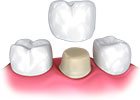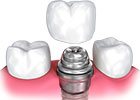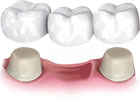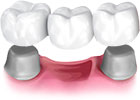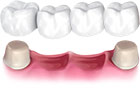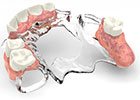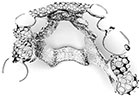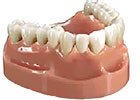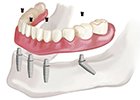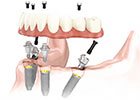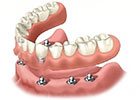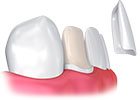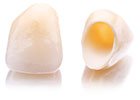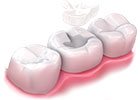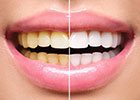DENTVITALIS d.o.o., Krešimirova 60, Rijeka, Croatia.
About implant dentistry
An implant is the best help a patient who has lost one or more teeth can get. The best way to replace a deficiency is by placing an implant. An implant is not only a simple screw that is embedded into the bone.
Large implant companies offer implants whose shape and surface are so well adjusted to the bone into which they are to be embedded that the success of the treatment is almost 100%. The choice of the implant according to the diagnosis and treatment plan makes it possible for the implant dentistry specialist and prosthetic specialist to meet the treatment plan agreed with the patient. It is crucial that implant placement procedures are carried out in accordance with the rules of the profession. Moreover, the indications for use of a particular implant must be followed. Not all implants are foreseen for all types of treatment. It is therefore very important for the implant dentistry specialist to have several implant systems available and to be trained for their application in accordance with the planned protocols.
Implants of increasing technological quality significantly affect the result of the implant placement procedure, but are not the only precondition for its success. The final outcome largely depends on the training and experience of the implant dentistry specialist, prosthetic specialist, assistants and dental technicians, use of advanced technology in diagnostics and the making of prosthetic replacements, as well as on the fulfilment of all decontamination and sterilisation protocols.
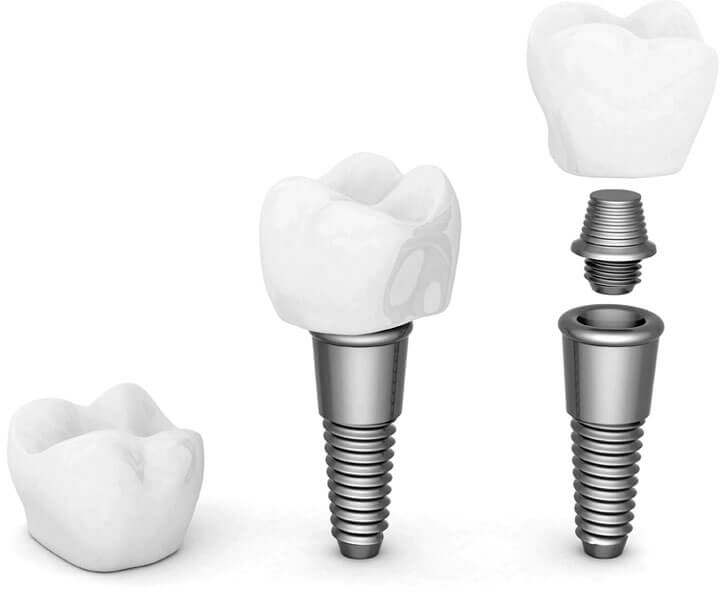
After the implant placement procedure
Patients often ask how they should act after undergoing implant placement procedure, that is, what are the symptoms after the procedure. In any case, if you have any doubts or fears, please contact us immediately.
- After the anaesthesia you were given during the procedure stops working, you might feel slight pain or discomfort. In that case, you can take an analgesic. Most patients feel no need to do so.
- During a period of 5-6 hours after the procedure, moderate bleeding can occur. Do not worry, it is completely normal. Patients often feel they are bleeding much more than they really are. In any case, make sure to avoid rinsing the oral cavity in the first 12 hours after the procedure. If the bleeding persists, we recommend taking a sterile gauze and pressing it lightly on the bleeding area, repeating the process 2-3 times. If the bleeding does not stop, make sure you contact us.
- For a few days after the procedure you can be swollen and bruising in the part that underwent the procedure. These symptoms do not appear in all the patients, and even if they do, you should not worry. Cold packs can be very helpful.
- To reduce discomfort after the procedure, we strongly recommend you follow the instructions your doctor gave you regarding the prescribed drugs. Moreover, immediately after the procedure, hold an ice bag, provided by our assistants, to your face. Repeat the process during 4-6 hours after the procedure, in 5-10 minute intervals.
- Drink only tepid or cold fluids for the first 12 hours. For the next 2-3 days, try to eat soft food, avoiding the area in which the procedure was carried out.
- Continue with standard oral hygiene, except in the area of the procedure. After 12 hours, rinse the oral cavity with the fluid you were given and follow the doctor's and medical personnel's instructions. Do not use mouthwashes or electric toothbrushes for the next 4 weeks.
- Do not drink coffee or smoke for at least 2 days after the procedure.
- Do not touch the area which contains the implant.
- Feel free to continue with your usual activities. In any case, it is recommended to avoid physical strain and excessive exposure to sunlight 30 days after the procedure.
- In some cases, the patient is given a desensitization preparation which removes the hypersensitivity within 24 – 48 hours.
- If the patient follows the instructions, maintains self-discipline and cooperates with the dentist, amazing and long-term results can be achieved.
Nobel biocare procera system
Nobel Biocare is the world's largest producer of dental implants and denture solutions based on CAD/CAM technology. The company’s headquarters is now in Switzerland. Besides implants, the company is involved in producing other components necessary for the successful replacement of a missing tooth, such as: zirconia and titanium abutments, crowns and bridges.
Nobel Biocare is the world's largest producer of dental implants and denture solutions based on CAD/CAM technology. The company’s headquarters is now in Switzerland. Besides implants, the company is involved in producing other components necessary for the successful replacement of a missing tooth, such as: zirconia and titanium abutments, crowns and bridges.
Procera® is the most advanced CAD/CAM system, developed for the purpose of optimising the aesthetic result. Since 1983, when this technology was used for the first time, millions of patients throughout the world have felt all the advantages of the Procera® system.
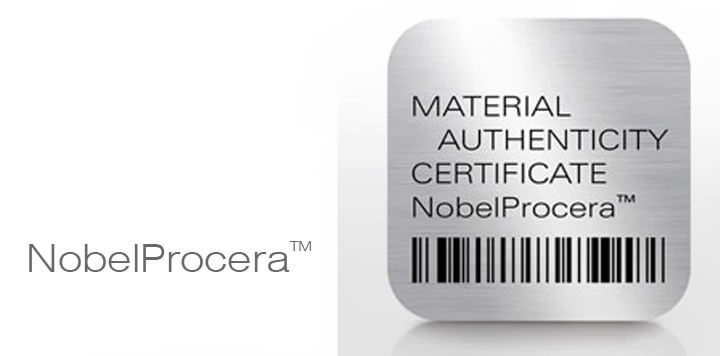
Nobel Guide - computer-guided implant dentistry
Unlike the planning of implant placement based on a panoramic image, computer-guided implant dentistry is based on results obtained by computer tomography (CT).
A three-dimensional (3D) jaw image makes it possible for the doctor to virtually place the implant in ideal positions. The role of the computer programme in that process is to warn the doctor about any problems regarding the selected treatment (e.g. vicinity of a nerve). Based on the obtained results and the plan, a detailed template is made which the doctor will use when placing the implant. The same template is also used in the making of prosthetic replacements (temporary and permanent) to achieve perfectly precise and aesthetically perfect work.
Besides that, the implant placement process does not last long, which significantly affects the patient's recovery period. As there are no incisions, there are also no sutures nor any post-operative swellings. After just one hour, the patient can have a temporary bridge placed on the implants.
Free examination
-
Organized accommodation Comfortable and beautiful
Depending on the requirements and wishes of each patient, we can organize or arrange the organization of your overnight stay.
-
Manner of payment
Pay with all major credit and debit cards(VISA, Mastercard, Maestro)
-
We guarantee for our services
DentVitalis offers a guarantee for all prosthetic and implant procedures!


